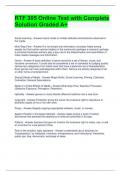RTF 305 Online Test with Complete
Solution Graded A+
Social Learning - Answer-Users model or imitate attitudes and behaviors observed in
the media
Multi-Step Flow - Answer-It is not simply that information circulates freely among
people, but that certain opinion leaders in the community (perhaps a reverend, perhaps
a prominent business woman) play a key role in the dissemination and assimilation of
mass media messages and information.
Genre - Answer-A basic definition of genre would be a set of literary, visual, and
narrative conventions. It could also be considered a set of standards for judging quality.
Genres are categories of an artistic work that have a particular set of characteristics.
Even genres can have subcategories within them. Genres are simply categories of art
or other forms of entertainment.
Strong Effects of Media - Answer-Magic Bullet, Social Learning, Priming, Catharsis,
Cultivation, General Assumptions
Weak or Limited Effects of Media - Answer-Multi-Step Flow, Selective Processes
(Selective Exposure, Perception, Retention),
Hybridity - Answer-genres or music blends different traditions into a new form.
Copyright - Answer-Protection giving the owner the exclusive right to reproduce or
distribute copies of his or her own work.
Piracy - Answer-Illegally copying copyrighted software, music, or movies.
Apple's Position in European Markets - Answer-Apple enjoys a level of market
dominance that attracted the attentions of antitrust authorities in Europe.
Patents - Answer-licenses that give an inventor the exclusive right to make, use, or sell
an invention for a set period of time
Role of the amateur radio operators - Answer-unrestricted use of airwaves for
"broadcasting"; by hobbyists, inventors, entrepreneurs; omni-directional, interactive,
public use; free, democratic, exchange of ideas
, Wireless' Role in the Titanic Disaster - Answer-this event represents a turning point in
history of radio; the government fears chaos in airwaves; the ultimate result is the
creation of the Radio Act of 1912, where the Navy controls radio broadcasts.
Radio Act of 1912 - Answer-control of the radio was given to the navy after the titanic
incident, but the government was afraid of foreign entities taking advantage of the idea
of the radio, required all wireless stations to obtain a license from the Commerce
Department. This addressed the problem of amateur radio operators cramming the
airwaves
Role of the Navy in the early development of radio broadcasting - Answer-control of the
radio was given to the navy after the titanic incident, but the government was afraid of
foreign entities taking advantage of the idea of the radio
Digital Convergence - Answer-can refer to the intersection of all data content in digital
format (writing, sound, pictures), intersection of media technologies with computers
(books, tv), intersection of corporations that deal with this type of technology (apple,
Disney), intersection of social processes that deal with this type of technology (news,
education, entertainment). Important because it allows for the collaboration of different
types of media forms in a new digital format.
Technological convergence - Answer-Integration of media that were once distinct In
their forms and use. Examples? Nano - mp3 player, radio, VIDEO; Kindle - books, on
screen; Tv: instant replays, shifting points of view, 3D movies; Social media in general is
more multitasking; Why is texting so much more common than calling? Less interactive
than a phone call, More interactive the media is the more control, More discrete, more
private, Multitasking
Economic convergence - Answer-the notion that globalization will result in the world's
poorer countries gradually catching up with more advanced economies
Conglomeration - Answer-are big businesses or corporations that own seemingly
unrelated holdings. They are made up of diverse parts from across several media
industries and are involved in multiple areas of business activity.
Evolution to an information society - Answer-The evolution and progression of
communication formats through time; oral in the preagricultural, print in the agricultural,
mass communication in the industrial, and digital in our now information society.
Oral communication - Answer-prevalent in pre-agricultural societies of hunters and
gatherers who depended on spoken word to communicate within the community.
Stories were passed down through generations by the power of speech and memory.
Because these societies were small and community-based, communication did not
need to transcend the realms of space and time. Today stories that originated as oral
communication exist in fairytales and folktales.





